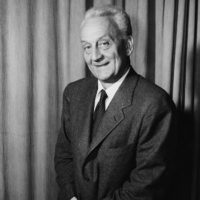
Albert Szent-Gyorgyi
University of Szeged
For the discovery of actomyosin, the essential contractible element of muscle.
The Albert Lasker Award for distinguished achievement in the field of cardiovascular diseases is presented to Albert Szent-Gyorgyi, whose contributions to knowledge of the body in health and disease are recognized throughout the world of medical science.
His research at the Biochemical Laboratory, Cambridge, England and at the Institute of Medical Chemistry, University of Szeged, Hungary culminated in the isolation of vitamin C, which won for him the Nobel Prize in Medicine in 1937. Following this, he turned to the investigation of muscular contraction, first at Szeged, then at the University of Budapest and eventually in this country. His profoundly important and basic studies are now going forward at his Institute for Muscle Research at Woods Hole, Massachusetts.
In the course of these investigations, Dr. Szent-Gyorgi and his co-workers discovered actomyosin, the essential contractile element of muscle, resulting from the interaction of two proteins, actin and myosin. Their concept that contraction in muscle represents a reaction of actomyosin and adenosine triphosphate, or ATP, has opened new areas of cardiac research and provided new insight into the fundamental physiology of the heart’s action. Through Dr. Szent-Gyorgyi’s pioneering work, new clues have been found to the mechanism of heart failure, and many barriers to the study of the normal and diseased heart muscles have been removed.
Dr. Szent-Gyorgyi is endowed with the golden touch. He has shown himself able to make exceptionally valuable contributions to any field of biochemistry in which he chooses to work. The American Heart Association has the honor to present the Albert Lasker Award to Albert Szent-Gyorgyi, an extraordinarily creative explorer of the frontiers of human knowledge.
